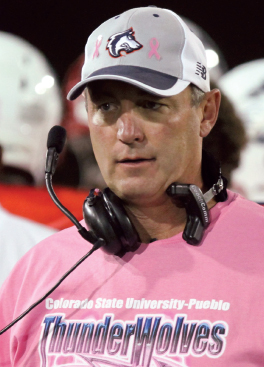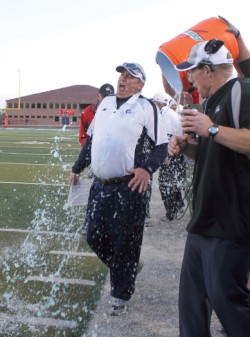Starting a program from nothing
Colorado State University-Pueblo football went from no helmets, pads, players or coaches in 2007 to back-to-back undefeated regular seasons
The lure of leading a start-up squad is easy to see. It’s your stamp on the program. You pick the players, the equipment, the facilities, the coaching staff and the vision for the program. At the same time, your focus is spread thin away from the Xs and Os as you attempt to build a foundation for the program to thrive.
|
For John Wristen, who was an all-conference quarterback at the University of Southern Colorado (which is now Colorado State University-Pueblo) from 1980-83, returning home to head Pueblo’s first football team since 1984 made a lot of sense.
A Pueblo native with deep roots in the area, Wristen knew where to find the state’s best players and he knew how to approach the community of Pueblo about supporting the program.Wristen’s main problem when he was hired to head the Thunderwolves’ program in July of 2007 was time. Instead of the standard two to three years between signing the contract and running out of the tunnel for the first regular season game, Wristen was provided slightly more than 365 days. With no junior varsity program in place, the CSU-Pueblo program became the first in the country to start from nothing and play a full college (Division II) schedule in just a year.
Setting a vision, securing equipment
CSU-Pueblo is Wristen’s first head coaching job (after serving as an assistant at UCLA, the University of Colorado and Northwestern University) and he had to start with no helmets, no balls, no pads, no coaches and no players. Instead of focusing on the tangible things from Day 1, Wristen first turned his attention to the “vision of the program” as he describes.
“The No. 1 objective I had after getting hired was to set a vision and find people to buy into this vision,” Wristen explains. “That means finding the right coaches, the right administrators and the right kind of community support.”
But, it’s easy to hide behind generic terms like “vision” and it’s another actually to define them.
 John Wristen set a vision for the new Colorado State University-Pueblo program based on bringing in high-character people. He endeared his program to the community by stressing football does not define the university. John Wristen set a vision for the new Colorado State University-Pueblo program based on bringing in high-character people. He endeared his program to the community by stressing football does not define the university. |
“The vision for our program is to be a part of the university, not the part of the university,” Wristen explains. “This school does not exist simply to play football, so we need high character individuals on our teams who do the right things socially and in the classroom, then we focus on their football talent.”
Hunter Hughes, the defensive coordinator for CSU-Pueblo, was one of Wristen’s first hires in 2007. Hughes served as a graduate assistant for three years at the University of Colorado under Wristen and understood the scope of the job in front of him. He buys into Wristen’s plan for CSU-Pueblo and works to bring in players who fit the mold, as well as his 3-4 defensive system.
“There are more linebacker-type players coming out of high school than defensive linemen, particularly in the state of Colorado. We look for players who run to the football,” Hughes explains. “They have to show a love for the game and desire to play. We make a big deal about character and grades.
If we see the type of player we want, we also want to make sure they fit the off-field aspects of our program centering around strong character and integrity. Our general philosophy here at CSU-Pueblo is we want to prepare these players for life after football.”
While Wristen’s first task was to set the vision, Hughes had to hit the ground running so players were equipped.
 John Wristen doesn’t want football to define CSU-Pueblo. |
“I knew my role as a coach but the roles here at Division II are a lot different than Division I. I was in charge of equipment from ordering to fitting to reconditioning and more,” Hughes explains. “So, to start a program from scratch, I had to think of everything from apparel to outdoor equipment. Each member of the staff has a specific duty, where I have equipment, others have travel, camp or recruiting responsibilities.”
Providing a longer leash
The cliché in coaching circles is that you are hired to be fired. Even in Wristen’s home state, the University of Colorado just let go Jon Embree after only four victories in two seasons. In a start-up situation, having an administration constantly looking over your shoulder and pushing for victories gets old. Wristen and Hughes say they never felt the pressure to win but knew they needed to have success on the field for CSU-Pueblo to reap the benefits off the field.
Initially after the announcement of football returning to CSU-Pueblo’s campus, athletic director Joe Folda says “there was huge excitement on campus and in the community,” as expected for the first year. Interest in program helped spur an increase in enrollment (see sidebar left). More enrollment means more money for the school, which promotes growth in education and research, and helps support athletics as well. Folda says attendance at games is strong and donations to the school have increased during this five-year stretch with football on campus.
At the same time, Folda isn’t presenting a case where the football team is making money. He says only “about 20 percent of Division I programs make money” and he adds that number is far less at the Division II level. On the flip side, the increased publicity has helped the school in ways that are difficult to measure.
“Our name is out there much more now than before. That kind of publicity–especially in our state–is something you cannot put a price tag on,” Folda says.
After a 4-6 campaign in the initial 2008 season (the fourth-best record ever in Division II for a start-up program), Wristen’s squad put together a 7-4 campaign in 2009.
Success continued in 2010 with a 9-2 mark and the squad’s first national playoff berth. In 2011 the team won the Rocky Mountain Athletic Conference title, earned its first No. 1 national ranking, finished the regular season undefeated and eventually lost a three-point game against the University of Minnesota-Duluth in the NCAA second round. The Thunderwolves completed another undefeated regular season campaign in 2012 and held the No. 1 ranking in the country for several weeks before bowing out in the national quarterfinals.
 CSU-Pueblo’s on-field success has led to increased enrollment, more donations to the school, as well as a steady stream of national publicity for the university. |
Success has come quickly but Folda explains even if the squad stumbled a bit more out of the gate in terms of wins and losses, he wasn’t planning to pull the plug on Wristen. Folda says he believed in his hire at the time and knows building a program is a process, which is something every coach wants to hear from the athletic director.
“When you hire a new coach, whether it’s a start-up program, someone retired or you needed to go in a new direction, you always hope for a lot of success,” explains Folda. “But, we believe more in the process. Our coaches are mentors to these athletes. They need the time to make connections and build for success.”
“We brought in quality young men who have made an impact on campus,” says Hughes. “There never has been any pressure from administration to win.”
Hughes adds that the only issue the coaching staff experienced with administration was educating everyone on how a football program works–it’s a bigger commitment than many people outside of football realize. “There had not been football here for 23 years and many of the administrators hadn’t dealt with the amount of people and resources needed to make this successful.”
Preaching patience with young players
Whether establishing a new collegiate football program or even something on a smaller scale such as a high school squad, inexperience is one of the largest obstacles to overcome. Wristen says the first year 110 players tried out for the team with 70 of those athletes being freshmen (19 of those freshmen lasted through this season, which is the first class of fifth-year seniors).
Wristen says he knew he couldn’t just ram a bunch of Xs and Os down the throats of players who hadn’t seen this level of action previously. He needed to take a different approach, which is an important concept for any coach featuring a squad of younger, inexperienced athletes.
“For the first year, I set high standards for them in practice to work hard and understand the process,” Wristen explains further by saying the focus turned toward being on time, doing everything they were told, walking through some drills for better comprehension and leaning more toward the role of empathetic teacher rather than drill-sergeant coach.
“You have to be sure players understand what is expected of them at practice everyday. Do this from the beginning. You cannot go back and re-teach it,” Wristen says. “As a coach with those early teams, I didn’t want to be a jerk but I did need to get my point across.”
Wristen adds that the first three years, CSU-Pueblo played extremely hard, had some success but was viewed as the “new kid on the block.” After back-to-back undefeated regular seasons, the Thunderwolves now are the ones who are the target. The coaching staff had T-shirts made for the players at the beginning of the season with a target on them to show everyone the team’s new place in the Division II landscape. Wristen says as expectations change you need to embrace and challenge them. Keeping the same mindset year after year forces a team into apathy and mediocrity.
With a 43-14 record in its five years since its re-inception, apathy and mediocrity are not options at CSU-Pueblo. “That is a credit to the player who came here when there was nothing but a hole in the ground. They believed in the coaches, each other and the vision we all had to be successful. They made it their mission to win a conference championship before they graduated–and we were able to do that,” Hughes concludes.





